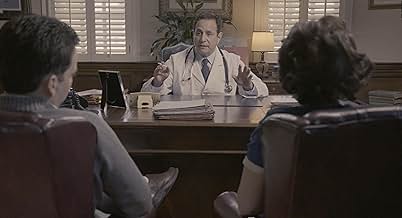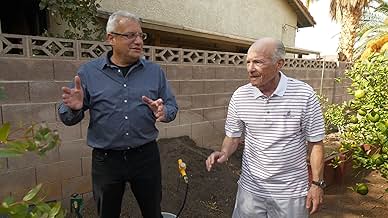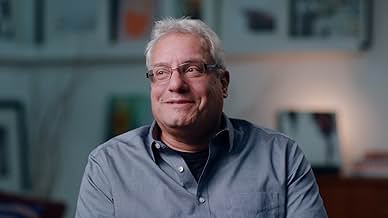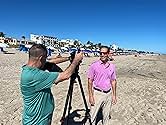When 54 year old Jon Baime takes a DNA test, his world and sense of self identity is shattered by a family secret.When 54 year old Jon Baime takes a DNA test, his world and sense of self identity is shattered by a family secret.When 54 year old Jon Baime takes a DNA test, his world and sense of self identity is shattered by a family secret.
- Director
- Writer
- Stars
- Awards
- 2 wins total
- Director
- Writer
- All cast & crew
- Production, box office & more at IMDbPro
Storyline
Featured review
"Filling in the Blanks": Unveiling Paternal Identities in a Modern Tale
"Filling In the Blanks" is a poignant and thought-provoking documentary that delves deep into the lives of middle-aged individuals who discover the truth about their biological fathers through proprietary DNA analysis. Directed with finesse and sensitivity, the film offers a revelatory exploration of identity, family dynamics, and the emotional rollercoaster that accompanies such unexpected revelations.
The film's central character, a middle-aged man grappling with the shock of discovering his true biological heritage, becomes the audience's guide through this complex journey of self-discovery. Through direct interviews, viewers are granted intimate access to the raw emotions of not only the protagonist but also his newfound brothers and sisters who share the same extraordinary situation. The documentary expertly captures their diverse range of reactions, highlighting that there is no one-size-fits-all response to such life-altering news.
One of the most compelling aspects of the documentary is its exploration of the varying emotional landscapes of the siblings. Some are genuinely surprised, while others experience a profound sense of relief, shedding the unwanted baggage of their non-biological fathers. Amidst these disparate reactions, one common thread emerges - the unwavering love and dedication of their mothers, regardless of the paternal complexities. This underscores the powerful and enduring bonds that tie families together, transcending the boundaries of biology.
As the narrative unfolds, the film deftly navigates the multifaceted layers of the human experience. It shines a spotlight on the societal shifts and attitudes of the past, specifically addressing the reluctant acceptance of artificial insemination during the 1960s. This contextual backstory adds depth to the broader discussion on identity and challenges our perceptions of family structures. The filmmakers are careful to present a balanced portrayal, allowing the audience to ponder the complexities and ethical considerations surrounding artificial insemination.
An engaging and heartwarming subplot centers around the siblings' journey to connect with their biological father. The documentary captures their excitement and trepidation as they embark on this unique quest for self-discovery. The genuine warmth and openness of the biological father as he welcomes his newfound children into his life provide a touching counterpoint to the initial shock of the revelations. His willingness to share his medical history and personal experiences helps foster a sense of closure and understanding for the siblings, who yearned for a connection that had been concealed from them for so long.
"Filling in the Blanks" excels in its ability to provoke introspection and dialogue on sensitive subjects. It raises important questions about the timing and necessity of disclosing the truth in cases of artificial insemination, highlighting the evolving perspectives on transparency and the potential impact on individual well-being. The documentary serves as a catalyst for conversations surrounding family secrets, the evolving nature of family structures, and the significance of genetic ties.
In conclusion, "Filling in the Blanks" is a captivating documentary that masterfully captures the complexities of identity, family, and the profound impact of newfound revelations. With its insightful storytelling and candid interviews, the film prompts viewers to reflect on their own perceptions of family and the power of genetic connections. By shedding light on the deeply personal experiences of the characters, the documentary succeeds in its mission to illuminate the intricate tapestry of human relationships and the transformative power of truth.
The film's central character, a middle-aged man grappling with the shock of discovering his true biological heritage, becomes the audience's guide through this complex journey of self-discovery. Through direct interviews, viewers are granted intimate access to the raw emotions of not only the protagonist but also his newfound brothers and sisters who share the same extraordinary situation. The documentary expertly captures their diverse range of reactions, highlighting that there is no one-size-fits-all response to such life-altering news.
One of the most compelling aspects of the documentary is its exploration of the varying emotional landscapes of the siblings. Some are genuinely surprised, while others experience a profound sense of relief, shedding the unwanted baggage of their non-biological fathers. Amidst these disparate reactions, one common thread emerges - the unwavering love and dedication of their mothers, regardless of the paternal complexities. This underscores the powerful and enduring bonds that tie families together, transcending the boundaries of biology.
As the narrative unfolds, the film deftly navigates the multifaceted layers of the human experience. It shines a spotlight on the societal shifts and attitudes of the past, specifically addressing the reluctant acceptance of artificial insemination during the 1960s. This contextual backstory adds depth to the broader discussion on identity and challenges our perceptions of family structures. The filmmakers are careful to present a balanced portrayal, allowing the audience to ponder the complexities and ethical considerations surrounding artificial insemination.
An engaging and heartwarming subplot centers around the siblings' journey to connect with their biological father. The documentary captures their excitement and trepidation as they embark on this unique quest for self-discovery. The genuine warmth and openness of the biological father as he welcomes his newfound children into his life provide a touching counterpoint to the initial shock of the revelations. His willingness to share his medical history and personal experiences helps foster a sense of closure and understanding for the siblings, who yearned for a connection that had been concealed from them for so long.
"Filling in the Blanks" excels in its ability to provoke introspection and dialogue on sensitive subjects. It raises important questions about the timing and necessity of disclosing the truth in cases of artificial insemination, highlighting the evolving perspectives on transparency and the potential impact on individual well-being. The documentary serves as a catalyst for conversations surrounding family secrets, the evolving nature of family structures, and the significance of genetic ties.
In conclusion, "Filling in the Blanks" is a captivating documentary that masterfully captures the complexities of identity, family, and the profound impact of newfound revelations. With its insightful storytelling and candid interviews, the film prompts viewers to reflect on their own perceptions of family and the power of genetic connections. By shedding light on the deeply personal experiences of the characters, the documentary succeeds in its mission to illuminate the intricate tapestry of human relationships and the transformative power of truth.
- How long is Filling in the Blanks?Powered by Alexa
Details
- Release date
- Country of origin
- Official site
- Language
- Filming locations
- Decatur, Georgia(location)
- Production company
- See more company credits at IMDbPro
Box office
- Budget
- $210,000 (estimated)
- Runtime1 hour 34 minutes
- Color
- Aspect ratio
- 16:9 HD
Contribute to this page
Suggest an edit or add missing content





















